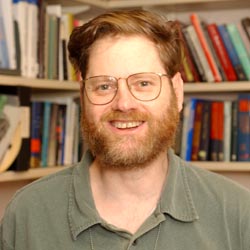| |
| |
| Steve Wise, Ph.D., Senior Investigator |
 |
Dr. Wise graduated from Dartmouth College in 1974 and earned his Ph.D. degree from Washington University in St. Louis three years later. After a brief postdoctoral stay at the Marine Biomedical Institute in Galveston, Texas, he came to NIMH in 1978. His graduate and postdoctoral work focused on the anatomical organization of the somatosensory cortex. Since coming to NIMH, Dr. Wise and his colleagues have used the methods of behavioral neurophysiology to study the functional organization of the frontal cortex, with particular emphasis on the premotor cortex and, more recently, on the prefrontal cortex.
|

|
Staff:
Research Interests:
Because of a disagreement in principle with the rules concocted by veterinary-safety establishment for primate research at NIH, the research in this section will be ending in early 2009. Accordingly, no positions are or will be available at any level.
Our recent research has focused on the frontal pole cortex and frontal-lobe mechanisms for the perception of relative durations. The former project, conducted by Satoshi Tsujimoto, yielded a surprising and surprisingly simple result. The frontal pole cortex (PFp, area 10 of Walker) is the part of prefrontal cortex that expands most dramatically during primate evolution. It has been implicated in several aspects of cognition. We found that PFp neurons encoded which goal subjects had selected, just before and/or after feedback,and they did so for both correct and incorrect choices. PFp cells did not encode the anticipation or delivery of fluid (reward) when it served as a cue, nor did they encode the visual cues, strategies, memory for previous goals, future goal choices or plans for future movements. Thus, during a brief period near feedback, PFp encodes which goal subjects selected, a signal that lasts longer when they need to remember their own choices. Our findings indicate that PFp plays a role in monitoring self-generated decisions.
The research on relative duration coding was conducted by Aldo Genovesio. In a relative duration task, subjects had to report which of two stimuli, presented sequentially, had lasted longer. In the time between the two stimuli, many neurons reflected the absolute duration of the stimulus and others encoded which stimulus had appeared first. After the second stimulus, many neurons encoded whether the first or second stimulus had lasted longer, and others encoded which stimulus had lasted longer. The encoding of relative duration is mostly categorical after the second stimulus, i.e., the cells reflect which stimulus lasted longer but not how much longer.
|
Selected Recent Publications:
Tsujimoto S., Genovesio, A., and Wise, S.P. (InPress) Neuronal interactions underlying goal selection and maintenance in prefrontal cortex, Cerebral Cortex.
Genovesio, A., Tsujimoto S., Wise, S.P. (2008) Encoding problem-solving strategies in prefrontal cortex: activity, European Journal of Neuroscience 27, 984-990.
Genovesio, A., Brasted, P. J. and Wise, S.P. (2006) Representation of future and previous spatial goals by separate neural populations in prefrontal cortex, Journal of Neuroscience 26, 7281-7292.
Genovesio, A., Brasted, P.J., Mitz, A.R., and Wise, S.P. (2005) Prefrontal cortex activity related to abstract response strategies, Neuron 47, 307-320.
Lebedev, M.A., Messinger, A., Kralik, J.D., and Wise, S.P. (2004) Representation of attended versus remembered locations in prefrontal cortex, PLoS Biology 2, 1919-1935.
All Selected Publications
Contact Information:
Dr. Steve Wise
Neurophysiology Section
Laboratory of Systems Neuroscience, NIMH
Building 49, Room B1EE17
49 Convent Drive, MSC 4401
Bethesda, MD 20892-4401
Telephone: (301) 402-5481 (office),
(301) 402-5441 (fax)
Email: stevenwise@mail.nih.gov
|
|















